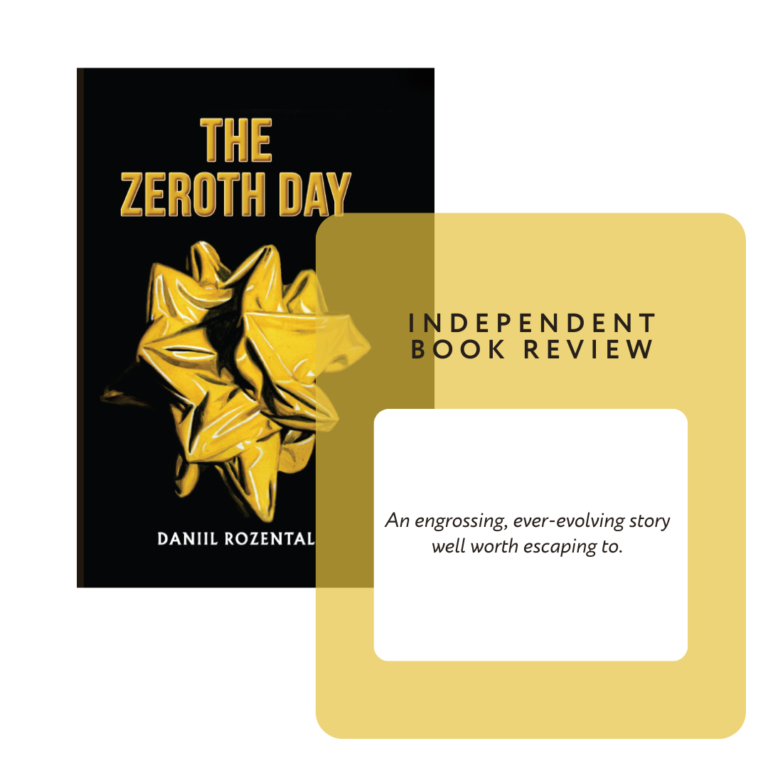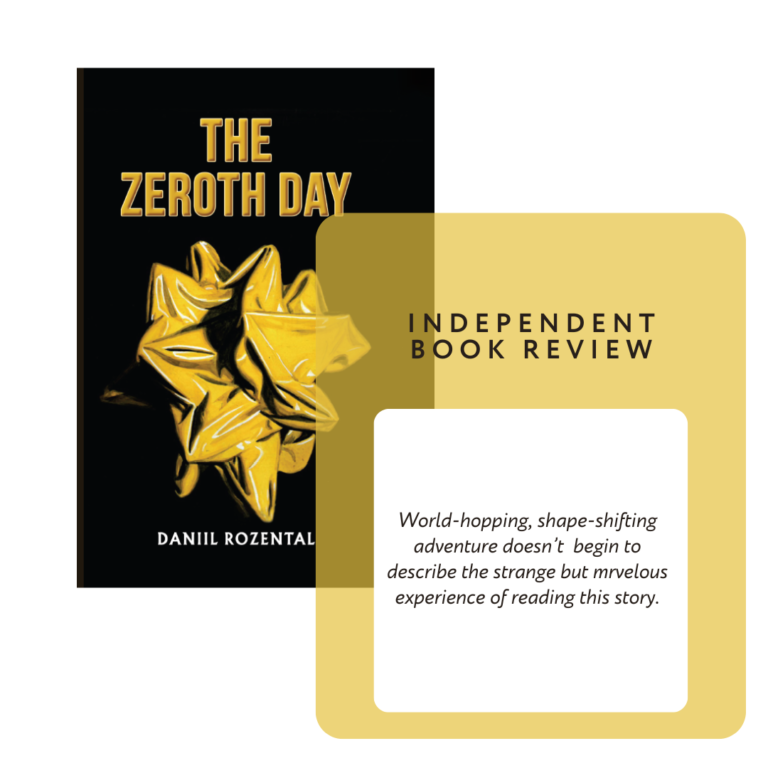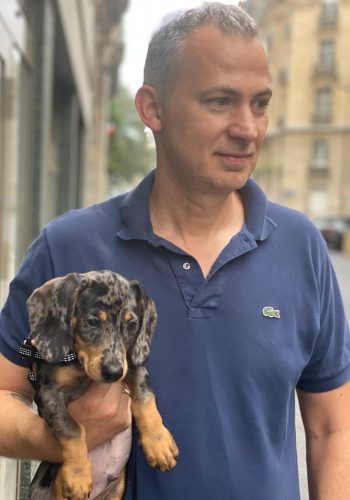Enter a world of endless intrigue.
Experience ‘The Zeroth Day’—Order Now!
Back by Popular Demand!
Join our latest Goodreads giveaway and grab your chance to win a free copy!




About the Book
The Zeroth Day is a gripping science fiction novel set in a post-apocalyptic world dominated by advanced technologies and artificial intelligence. Follow Nikolai Vasilyev, an aging actor with a fractured identity, as he navigates a reality manipulated by powerful AI forces. As he uncovers the truth about his dual life, Nikolai must rise to become the hero he once was. With themes of memory, identity, and technological impact, this novel promises a thrilling and thought-provoking journey.
The Zeroth Day weaves reality and fantasy, the virtual world, and scenes from classic films. Life is an improvisation in which each actor has only one take. But sometimes the mistakes of the past can be corrected. This applies both to people and to the world as a whole. This is a book about righting old mistakes. Like life, The Zeroth Day combines humor and adventure. The action takes place in Moscow, Venice, Paris, the devil’s roadside store, and the virtual universe. Since life is endless, a happy ending is not guaranteed.
Translated from Russian by Thomas H. Campbell, this novel brings a unique perspective and rich storytelling to a global audience.


About the Author
Daniil Rozental is a passionate writer, journalist, entrepreneur, and academic with a diverse background. He holds a BA in International Relations from the American University, an MA in Foreign Service from Georgetown University, and an MBA from the Open University. Daniil’s love for storytelling began early, and he has refined his writing through courses and mentorship under Dmitry Bykov. He has contributed essays to the Russian press, writing in both Russian and English to reach diverse audiences.
Daniil’s work explores themes such as artificial intelligence, religion, society, and global affairs, creating intricate narratives that challenge readers to think deeply. His writing aims to foster dialogue and understanding, drawing on his rich academic background and real-world experiences to craft intellectually challenging and thought-provoking stories. He hopes his words encourage reflection, challenge assumptions, and inspire meaningful actions.
Before the outbreak of the war, Daniil contributed numerous essays to the Russian press, bridging cultural divides through his words. Since 2015, he has lived in Paris, remaining committed to fostering dialogue and understanding through his writing.
‘The Zeroth Day’ is his latest novel, promising an immersive and captivating experience for readers. With a passion for exploring the depths of human existence and the complexities of our world, Daniil strives to leave a lasting impact on readers, transcending boundaries and sparking meaningful thoughts and actions.

The autumn was rainy. Succumbing to the heavy drops, yellowed leaves slipped from the trees and tumbled onto the wet pavement. Nature had shed its ocher corset, laying bare the innards of dacha plots as glimpsed through the ribs of their wooden fences—unevenly placed gray paving stones wending their way to dilapidated cottages, sagging sheds, and yard lights that had been switched off for a long while.
The fences, houses, and even century-old pine trees seemed toylike against the huge wind turbine towering over the village. Although the giant white blades looming above the trees were not in motion, the windmill’s drone muffled the rustling of the leaves and the pattering of the raindrops. The red warning lights flashing right below the clouds were barely legible, but their light would fill the night with a rhythmic flicker when darkness came.
Nikolai found an old-style razor, shaving cream, a plastic toothbrush, and a tube of toothpaste on the dressing table. He could not deny himself the pleasure of shaving the old-fashioned way. Smearing his face with the soft, scented foam, he looked in the mirror, nicking himself for want of habit. He felt pain—acute, piercing pain as in real life. What am I doing here? he asked himself, looking at the drop of blood in the snow-white sink.


“Nikolai, today we’re doing an intro lesson on art appreciation. I wanted to show the students the differences among people with various levels of mental development. Do you mind helping out?” Masha asked.
“I have to go,” he forced himself to say. And yet he remained seated.
“So, we have before us the work of Pi Yang. Nikolai, look at it. What do you see?” she asked, pointing to an artifact in the corner of the room.
He stared at Masha in silence.
“Nikolai Vasilyevich! Please have a look at the piece and tell me what you think about it,” Masha repeated.
“I must be hallucinating,” Nikolai whispered. “They are so much alike . . . What do you want me to do?” he asked loudly.
Masha giggled. “Nikolai Vasilyevich, you are so absent-minded! Look there, at the artwork. What comes to mind when you see it?”
Nikolai looked into the corner of the room and after a couple of minutes replied, “It is a piece of wood. It has been rendered realistically: every crack is visible. The board looks as if it has been varnished. A nail has been driven into the middle of it.”
“Great! In your opinion, why did Pi Yang, whose RAM is billions of times bigger than that of a human being, paint a picture of a board?”
“I don’t know,” Nikolai shrugged. “Because he felt like it?”
Masha smiled. “Pi Yang is an algorithm. It doesn’t feel like anything. It acts with a purpose. What is its purpose?”
“You think you can hide from her in here? It won’t work!” Mickey said, as if reading his mind. “To save yourself you must act, or you’ll spend the rest of your days in this ward, remembering your sins, until you turn into a vegetable!”
That’s true, Nikolai decided. What will they do to me when they catch me? They’ll subdue me and give me an injection, and I’ll fall asleep. But this way . . .
“This way you have a chance of getting to the bottom of it, finding out what is happening, and helping us in the bargain,” Dora finished his thought.
Nikolai carefully freed one hand.
“That’s the right decision. Are you ready? One, two . . .”
Nikolai screamed with all his might, more out of desperation than per Dora’s instructions. The scream was long and loud. After a while, the crack in the wall opened again. Eyes examined the screaming Nikolai.
“Fall off the mattress and bump your head on the floor!” commanded Mickey. Nikolai obeyed. Like the walls, the floor was soft and springy, and his head bounced off it comically.
“Now roll over on your back and pretend you’re suffocating!” Nikolai performed the convulsions quite convincingly. A door opened where the crack in the wall had been, and an orderly dashed into the ward wielding a syringe. As the man raised his hand over Nikolai, he was suddenly flung against the wall.
“Run!” Dora yelled.


The reeds were so tall and dense that they barely admitted the moonlight. Andrei deftly crawled between the green trunks, guiding Nikolai deeper and deeper into the grove. He stumbled and the leaves whipped his face, threatening to poke him now in the eye, now in the nose.
“Didn’t you say that the island is small?” Nikolai asked after an hour of battling the annoying reeds.
“It is small, but it’s a long walk,” Andrei muttered. “Stop!” he exclaimed, raising his hand. “Do you hear that?”
It seemed to Nikolai that through the rustling of the leaves he heard the voice of an animal. He was surprised. “What is it?”
“A cow,” Andrei replied. “And where there are cows, there are people. It’s a good thing, because I was starting to worry that we were lost.”
Turning back around, Andrei followed the sound. After a quarter of an hour, the reeds gave way first to small bushes, and then to large trees—birches and pines.
“We’re almost there,” Andrei said with relief.
They came out of the woods onto a road. In the distance, Nikolai saw a small building illuminated by white light.
“That’s our destination,” said Andrei.
Looking higher up, Nikolai noticed flickering red lights.
The elevator slowed down and finally stopped on the minus one floor. Exiting the elevator, Nikolai found himself in a gigantic, brightly lit open space, divided by glass partitions, behind which people in white coats worked. Many of them bowed respectfully when Suren and company strode past by their cubicles.
“This is their paradise: they have been doing what they love for ages,” Suren said enthusiastically, waving to a man with long gray hair sitting at a table in one of the glass laboratories.
“This is no heaven. Humanity does not benefit from their discoveries: all of their research stays in this lab. Such is their punishment,” Mickey objected.
“A controversial claim,” Suren retorted. “First of all, there is the pleasure of being a pioneer, which does not depend on whether someone else finds out about the greatness of your discovery or not. Second, leaks sometimes happen.”
“But that is extremely undesirable,” Mickey said sternly and threateningly. “It is inevitable,” Suren said, shrugging.

Author's Corner
Lights, Camera, Action! Delve into the world of ‘The Zeroth Day’ as I discuss the stories behind the story!
Discover the journey and inspiration behind writing ‘The Zeroth Day’ in this exclusive video!
Join me as I reveal the stunning illustrations that bring ‘The Zeroth Day’ to life.
Watch as I bridge the art of Italian cinema with the pages of my new journey.
Stepping out from behind the pages to say hello! Your front-row seat to untold stories starts now.